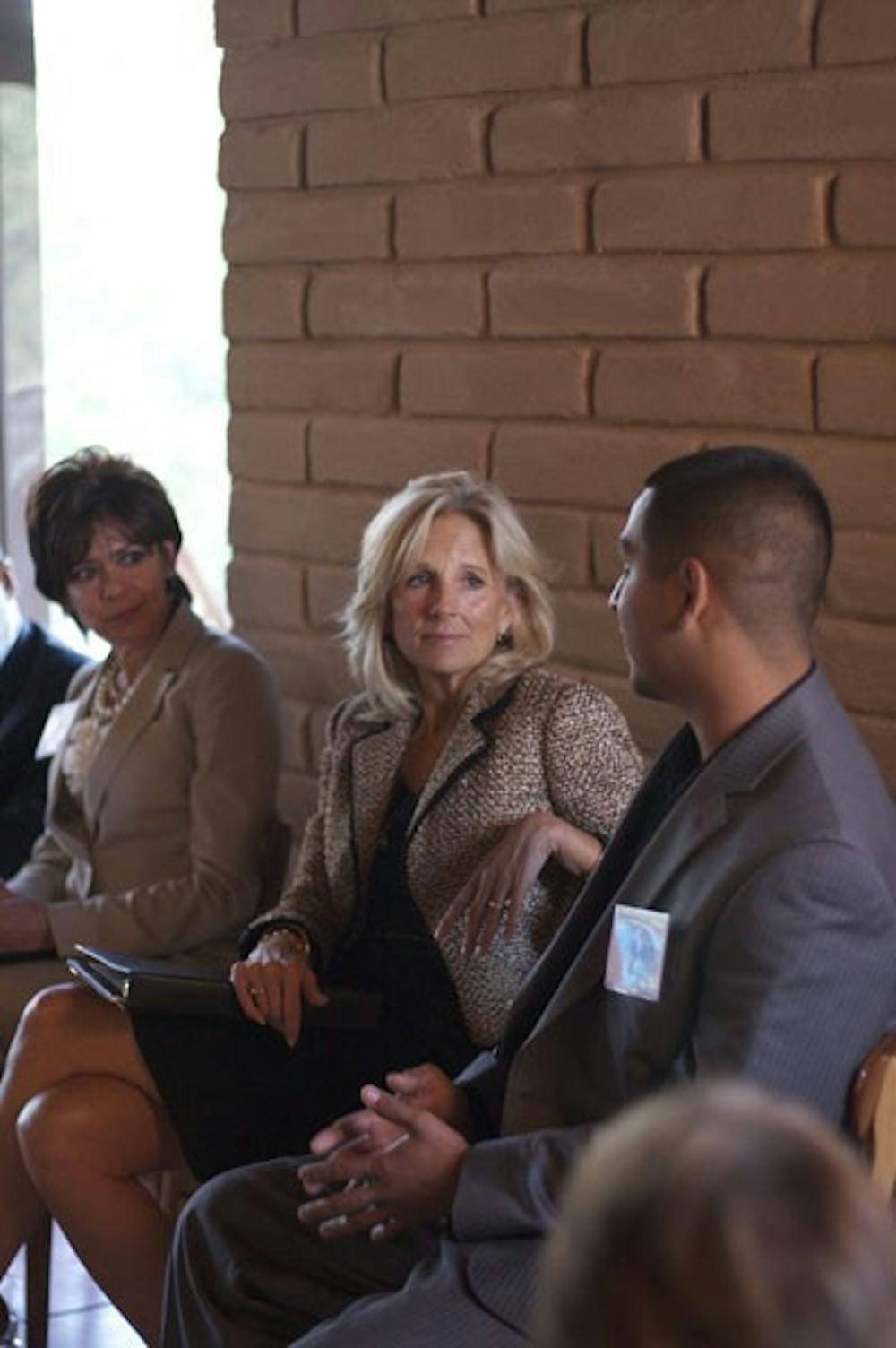Jill Biden, the wife of Vice President Joe Biden, sat down with community college and University administrators in Tempe on Friday to listen and learn about the Maricopa-ASU Pathways Program, or MAPP, which helps students make easier transitions from the Maricopa Community College system to the University.
Biden’s visit was part of a fact-finding mission assigned to her by President Barack Obama.
This fall, the second lady will host a national summit at the White House, where business leaders, college presidents and teachers will come together to share ideas and offer insight into what Biden calls “one of the best-kept secrets of higher education” — community college.
Biden has been traveling to various community colleges throughout the country for more than a year, gathering information and working on an agenda for the upcoming summit, which has not yet been scheduled.
Tempe was just one of her many stops.
About 20 administrators, teachers and students, including ASU President Michael Crow, were part of Friday’s round table discussion, which took place at the O’Connor House in Papago Park. Biden mostly listened while administrators spoke about MAPP and how an easy transition from community college to a university can help a student succeed.
“We can show and we can demonstrate that students who come through programs like the MAPP are just as successful, in some cases more successful, than any student,” said David Young, ASU senior vice president for academic affairs.
MAPP is a program that began last fall where community college students can complete lower-division coursework toward an ASU degree at one of the 10 Maricopa institutions.
Students in the program are guaranteed admission into ASU, are eligible for exclusive scholarships and, once enrolled in the University, are charged a tuition rate that is in accordance with the year they entered the program.
In coming up with the idea for the MAPP program, Young said the designers focused on course applicability, not just transferability.
“That was a really important element to the MAPP program — that students are taking courses that prepare them to go directly into the major, not just random courses,” he said.
The program currently offers pathways into 50 ASU majors, including psychology, history and political science.
Tanner Cameron, a political science freshman at Mesa Community College, who was present at the meeting, is enrolled in the MAPP program for the upcoming fall semester.
“I started my first semester last fall and kind of didn’t know what I was going to do,” Cameron said. “Basically, I was just taking classes just to take classes.”
When his advisor spoke to him about the program, Cameron said he saw it as a great opportunity to transition from a community college education into a university education — a similar path taken by his mom and two of his siblings.
“The interesting part of the MAPP program is that it provides structure for the student,” said Tanner’s dad, Preston Cameron. “Tanner is enjoying an opportunity that his brother did not have.”
Preston Cameron explained that his other son, who graduated from ASU with a biochemistry degree, missed out on the guidance the MAPP program provides.
“To know that when that student comes out on the other end, they will be university-ready, … there’s some confidence there that a parent takes with them as their child goes through that program,” he said.
Rufus Glasper, chancellor of Maricopa Community Colleges, told Biden that the ASU and Maricopa Community College alliance is working toward Obama’s goal of increasing the number of college graduates in the United States.
In early 2009, the Obama administration tasked the country with leading the world in the number of college graduates by 2020.
“To meet the president’s objective … the first thing we all have to focus our attention on is a very leaky and broken pipeline,” Crow said.
By “pipeline,” Crow was referring to a student’s journey through the nation’s school system. One connection of the pipeline is between community colleges and universities.
In order to fix this, Crow said universities should take responsibility for their failings and concentrate on improvements.
“The first thing that we’ve been working on, which is the hardest, is to defeat elitism,” Crow said.
Elitist thinking between universities and community colleges can be destructive to the outcome of the nation, he said.
“A lot of that elitism is actually perpetuated inadvertently by the department, by universities, by policies, by procedures and by culture, so it’s a key thing to defeat it,” Crow said.
Reach the reporter at kjdaly@asu.edu





